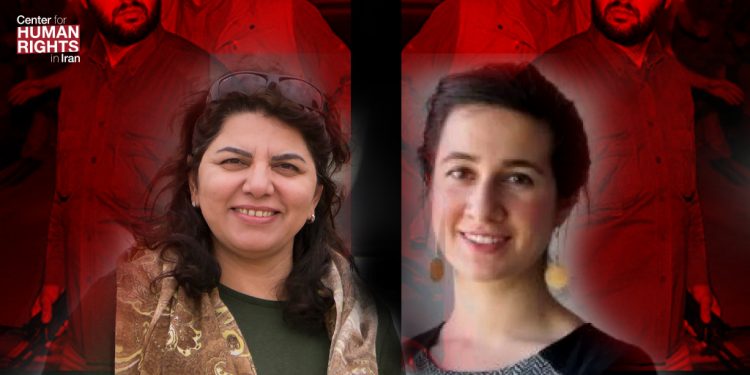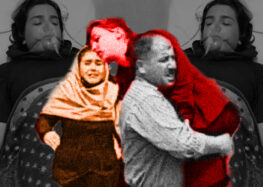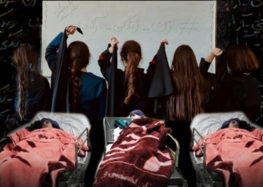Iranian Agents Tried to Frame Detained Conservationists by Staging Scenes to Falsely Implicate Them

Three Major State Agencies Rejected Charges of Espionage, Indictment Based on Retracted False “Confessions”
February 11, 2019 – Amid eight conservationists’ closed-door trial in Iran’s revolutionary court system, the Center for Human Rights in Iran (CHRI) has been informed that agents staged scenes around at least two of the detainees with the intent of implicating them in a false narrative.
In one instance, plainclothes agents transported conservation scientist Niloufar Bayani out of Evin Prison in Tehran to several locations in an affluent town for a day and directed her to engage in specific acts while filming her without her consent.
In another instance, plainclothes agents including a film crew forcefully entered the home of now-deceased academic Kavous Seyed-Emami (one of the original nine conservationists arrested who died while in detention in Evin Prison in February 2018 under highly suspicious circumstances) and pressured his grieving widow to make false statements on camera while denying her access to a lawyer.
While she was being interrogated, several other agents transported boxes into her basement and blocked off access to it for several hours before leaving without explanation.
“For the past year, Iran’s security apparatus has been colluding with judicial officials to cook up cases against these conservationists who’ve been denied the right to defend themselves,” said CHRI’s Executive Director Hadi Ghaemi.
“Not only are they being tried based on false ‘confessions,’ now we’ve also learned that agents staged scenes around them to support a false narrative,” Ghaemi added.
Staging Scenes of “Guilt”
A source with detailed knowledge of the conservationists’ cases told CHRI that in September 2018, Bayani “was unexpectedly taken from Evin Prison by a convoy of plainclothes officers in four cars to a number of locations in Tehran and its vicinity.”
“She was first taken to a beauty salon in the center of Tehran and offered a haircut; then to a luxury shopping mall in [the town of] Lavasan and encouraged to go on a shopping spree,” said the source who requested anonymity for security reasons. “She refused to leave the car in both instances.”
“She was then taken to a luxury villa in Lavasan and offered to step out of the car and take advantage of the fresh air and the amenities in the garden, which she also refused,” added the source.
The source continued: “Upon needing to use the bathroom after several hours, she noticed that one of the plainclothes officers was filming her every move from behind a tree. She immediately retreated to the car. The convoy then stopped at a restaurant on the way back to Tehran and the officers had lunch, which she again refused.”
“It’s unclear who ordered and allowed this unlawful tour and jeopardized the safety of an arrested young conservation scientist,” added the source.
After Bayani told her parents about the incident when they visited her in Evin Prison in November, prison authorities warned her not to speak about it again. “Afterwards she did not get a visit for a while,” said the source.
Planting “Evidence”
Ramin Seyed-Emami, the son of Iranian Canadian sociologist Kavous Seyed-Emami, told CHRI that agents raided his home in Tehran “numerous times” after his father’s death. One instance involved dozens of agents, boxes with unknown contents transported into his basement without his mother’s consent, and a camera crew.
Shortly after Seyed-Emami’s death, which officials claim was a suicide despite a preliminary autopsy report that omitted his cause of death and the presence of unexplained injection sites on his corpse, agents raided the home, confiscating “several boxes of personal belongings.”
Months later on June 25, 2018, while millions of Iranians were focused on a World Cup match, dozens of plainclothes agents returned to the home, which was only occupied by his widow Maryam Mombeini, forced their way past the doorman and proceeded to pressure her to make false statements on camera while denying her access to a lawyer.
While she was being filmed by agents of the state-run Islamic Republic of Iran Broadcasting (IRIB) organization, other agents brought boxes into the family’s basement, which Ramin Seyed-Emami had used as a musical recording studio, and denied anyone entry for several hours.
“My mother was alone that day and she wasn’t allowed to see what they were doing in the basement,” Seyed-Emami, who has been based in Vancouver, Canada since March 2018, told CHRI. “Our lawyer, Mr. [Arash] Keykhosravi, also came to out the house but he was not allowed inside.”
“Why in the world would agents take six boxes inside a suspect’s home?” he said. “They forced my mother to sign an itemized inventory but she never had any knowledge of what they had done during those four hours and what they had brought inside.”
“I loudly declare that planting things in our house without any supervision of these agents was against the law and any filming that took place was an attempt to stage a scene,” Seyed-Emami added.
“After the four-hour raid on our house, my mother had a nervous breakdown and had to be taken to the hospital,” said Seyed-Emami. “What is the justification for constantly intimidating and harassing a family?”
Mombeini has been barred from leaving Iran despite calls from the Canadian government for her to be granted permission to travel back to Canada to live with her two sons who left Iran in March.
According to Article 699 of Iran’s Islamic Penal Code, “Anyone who, knowingly and deliberately, with the intent to accuse an individual, without his knowledge, manipulates or conceals the tools and means of a crime or any object for which its possession can be prosecuted.”
It is not known who ordered Bayani to be filmed while engaging in staged actions outside her cell or who ordered the raid on the Seyed-Emami home. But human rights groups have documented several instances in which detainees held on politically motivated charges or their family members were featured in pseudo-documentary videos that contained false information and which were produced by or in collusion with security agencies and then broadcast by IRIB to discredit and smear the detainees.
Formerly Iran-based human rights lawyer Shirin Ebadi, a Nobel Peace laureate, wrote in the New York Times in 2016 that Iranian agents had filmed her husband having an affair with another woman, a capital offense in Iran, and threatened him with prosecution if he did not make false statements on record to be broadcast by IRIB implicating his wife in national security crimes.
Kavous Seyed-Emami’s family has petitioned IRIB to allow them to respond to the unsubstantiated accusations the broadcaster has aired against the deceased conservationist.
Three major state agencies in Iran, including the country’s highest security body, have stated that the detained conservationists are all innocent of the spying charges they’re being held on.
Their continued detainment has prompted an international outcry. The UN has called the charges against the conservationists “hard to fathom” and in February 2018 stated, “Nowhere in the world, including Iran, should conservation be equated to spying or regarded as a crime.”
Yet Iran’s judiciary is continuing to try them while restricting their right to a full defense and despite one detainee’s statement on record that she was forced to make false “confessions” under the threat of torture.
“For years, IRIB has been working with Iran’s security apparatus to paint a picture of guilt around detainees held on politically motivated charges,” said Ghaemi. “They have tried to make the cost of speaking out too high for their victims, but more and more Iranians are refusing to be silent.”
“Instead of investigating conservationists and making a mockery out of the judicial process, Iran’s judiciary should be investigating Seyed-Emami’s sudden death in prison and the ill and unlawful treatment of these and all political prisoners held on trumped-up charges,” he added.






